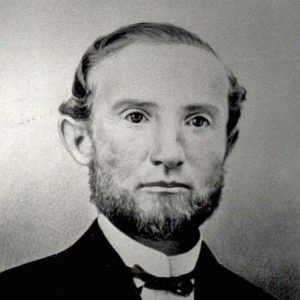Under the eves…Volume 1 Issue 7 Henry Miller and Charles Lux become partners
 Charles Lux had similar experiences to Millers…
Charles Lux had similar experiences to Millers…
They both left Germany and traveled to New York and both had worked as butchers in New York. The only difference was that Lux had arrived in California a few months earlier than Miller had. Because of the nature of the cattle business and because of the volume that the company had grown to, Miller & Lux decided that they needed to draw up an agreement. By this time, they had successfully worked together for over 15 years, but had seen what had happened to other companies when things went wrong. They wanted an agreement that would cover both of them should problems arise. On June 24, 1875 and again on May 22, 1884 they drew up an agreement that stated:
Witnessed: “Whereas, said Miller and Lux have been co-partners for many years last past, to wit: from the 6th day of October 1858 and as such co-partners have been engaged in the business of buying land and rearing, grazing, and buying and selling cattle and horses; and their co-partnership business has extended into other kinds, but generally pertained to the business above named, and they are now continuing the same and propose to go on as heretofore: and whereas their said business and property is of such character and in such condition. That whenever they may conclude to close, settle and terminate the same, several years will be necessary to do so without injury, loss, and sacrifice.
Now in view of the foregoing and in consideration of the matters and things pertaining to said business and for their mutual benefit and advantage that thereby agree to and with each other as follows:
That in the event of the death of either of the said co-partners, then the survivor shall continue to carry on the said business for joint use of himself and the estate heirs and legatee of the deceased for such period of time after the decease as he may deem necessary in order to close and settle up the business without detriment or sacrifice; provided that said time may be extended to but not beyond the period of seven years after such decease.
During the time that the surviving party shall carry on and the said business, all of the co-partnership property, real, personal and mixed, and the control, management, sale and disposition thereof shall be under the exclusive charge and dominion of the said survivor and the executers, heirs and legatees or trustees of the deceased or the trustees of any of the legatees of the deceased shall have no power or control over the same except such as may be given by the will and consent of the survivor.
The surviving partner shall have the power to hire, lease, sell and convey all of the personal property of the partnership without let or hindrance at such process and on such terms as he may see fit, and the real property of the partnership may be leased, sold and conveyed by the survivor as he may deem proper, and the executors of the deceased shall join in the conveyance.
The said surviving partner shall control and manage all said real estate during all of said seven years except such as shall be sold by him during that time. Both parties hereto agree to make proper provision in their wills to carry out this agreement.”
The above agreement proved very fortunate for Henry, and was the key to his successful business empire. As it turned out, Charles Lux died nearly thirty years before Henry Miller did. With this agreement in place, Henry was able to stave off partitioning the land for at least seven years after Lux’s death in 1887. There were many Lux heirs both in America and in Germany. Their lawyers and agents, who were anxious to represent them in any capacity, constantly harassed Henry. Miller was in lawsuits from 1887 to 1897 defending himself against the Lux heirs. If Henry declared a stock dividend from the surplus, they complained that he should have put money back into the business. If he did put money back into the business, they complained that he should declare a stock dividend. In their minds, Henry was benefiting to their great disadvantage.
On May 5, 1897 an agreement was reached and a new company was formed; Miller & Lux Divided Lands, Inc. The new company began with a capital stock of twelve million dollars and was to be operated for fifty years, with the purpose of acquiring all the property and assets of the late, firm of Miller & Lux. The Secretary of State certified the agreement. By this agreement, Henry now own fifty percent of the company’s stock and the Lux heirs held the other fifty percent. As the years went by, Henry bought out the Lux heirs and by 1916, the year of his death, he had virtually become the sole owner of Miller & Lux Divided Lands, Inc.
1Edited by Charles Sawyer, Interviews by Ralph Milliken, One Man Show Henry Miller in the San Joaquin, (Los Banos: Ralph Milliken Museum Society, 2003)
Comments
Tell us what you think about this blog post.
